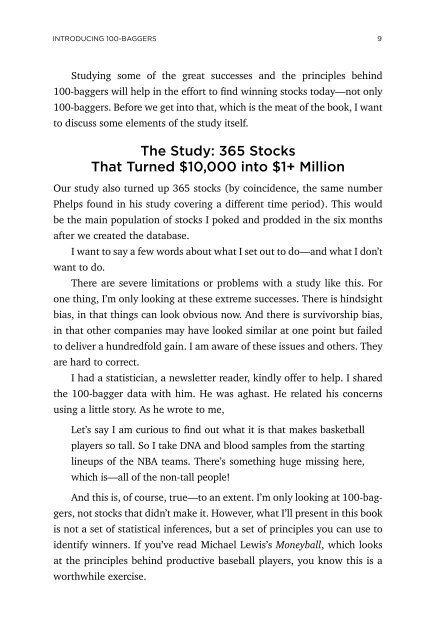Create successful ePaper yourself
Turn your PDF publications into a flip-book with our unique Google optimized e-Paper software.
INTRODUCING 100-BAGGERS 9<br />
Studying some of the great successes and the principles behind<br />
100-baggers will help in the effort to find winning stocks today—not only<br />
100-baggers. Before we get into that, which is the meat of the book, I want<br />
to discuss some elements of the study itself.<br />
The Study: 365 Stocks<br />
That Turned $10,000 into $1+ Million<br />
Our study also turned up 365 stocks (by coincidence, the same number<br />
Phelps found in his study covering a different time period). This would<br />
be the main population of stocks I poked and prodded in the six months<br />
after we created the database.<br />
I want to say a few words about what I set out to do—and what I don’t<br />
want to do.<br />
There are severe limitations or problems with a study like this. For<br />
one thing, I’m only looking at these extreme successes. There is hindsight<br />
bias, in that things can look obvious now. And there is survivorship bias,<br />
in that other companies may have looked similar at one point but failed<br />
to deliver a hundredfold gain. I am aware of these issues and others. They<br />
are hard to correct.<br />
I had a statistician, a newsletter reader, kindly offer to help. I shared<br />
the 100-bagger data with him. He was aghast. He related his concerns<br />
using a little story. As he wrote to me,<br />
Let’s say I am curious to find out what it is that makes basketball<br />
players so tall. So I take DNA and blood samples from the starting<br />
lineups of the NBA teams. There’s something huge missing here,<br />
which is—all of the non-tall people!<br />
And this is, of course, true—to an extent. I’m only looking at 100-baggers,<br />
not stocks that didn’t make it. However, what I’ll present in this book<br />
is not a set of statistical inferences, but a set of principles you can use to<br />
identify winners. If you’ve read Michael Lewis’s Moneyball, which looks<br />
at the principles behind productive baseball players, you know this is a<br />
worthwhile exercise.


